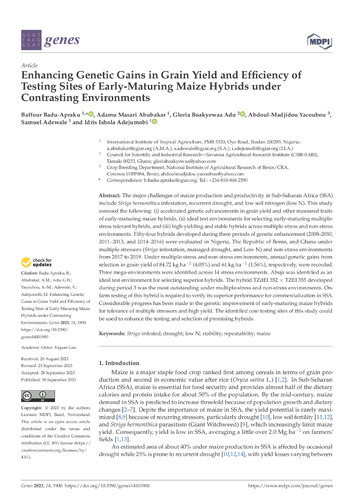Enhancing genetic gains in grain yield and efficiency of testing sites of early-maturing maize hybrids under contrasting environments
Abstract
The major challenges of maize production and productivity in Sub-Saharan Africa (SSA) include Striga hermonthica infestation, recurrent drought, and low soil nitrogen (low N). This study assessed the following: (i) accelerated genetic advancements in grain yield and other measured traits of early-maturing maize hybrids, (ii) ideal test environments for selecting early-maturing multiple-stress tolerant hybrids, and (iii) high-yielding and stable hybrids across multiple-stress and non-stress environments. Fifty-four hybrids developed during three periods of genetic enhancement (2008–2010, 2011–2013, and 2014–2016) were evaluated in Nigeria, The Republic of Benin, and Ghana under multiple stressors (Striga infestation, managed drought, and Low N) and non-stress environments from 2017 to 2019. Under multiple-stress and non-stress environments, annual genetic gains from selection in grain yield of 84.72 kg ha−1 (4.05%) and 61 kg ha−1 (1.56%), respectively, were recorded. Three mega-environments were identified across 14 stress environments. Abuja was identified as an ideal test environment for selecting superior hybrids. The hybrid TZdEI 352 × TZEI 355 developed during period 3 was the most outstanding under multiple-stress and non-stress environments. On-farm testing of this hybrid is required to verify its superior performance for commercialization in SSA. Considerable progress has been made in the genetic improvement of early-maturing maize hybrids for tolerance of multiple stressors and high yield. The identified core testing sites of this study could be used to enhance the testing and selection of promising hybrids.

